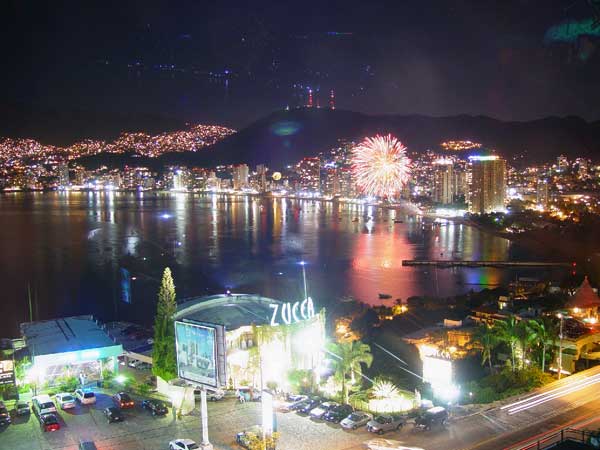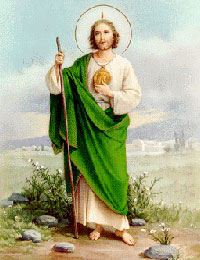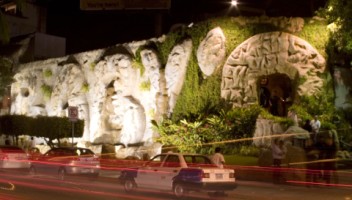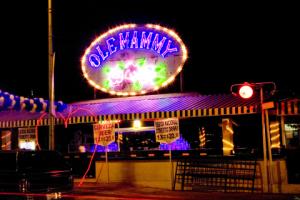The Best Festivals and Holidays in Acapulco
Acapulco is a city that knows how to celebrate. Throughout the year, it thrives on holidays and long weekends, attracting both locals and tourists. Some of these celebrations, like Halloween and Spring Break, have been brought to Acapulco by visitors, while others, deeply rooted in the Roman Catholic calendar, have been observed for generations.
Additionally, there are "official" holidays that grant workers a day off (or double pay if they're required to work), as well as "civil holidays" that are notable but do not offer time off.
Christmas and New Year's

In Acapulco, Christmas is celebrated on the evening of December 24, when families exchange presents. December 23 is often the busiest shopping day of the year as locals prepare for the festivities.
The period between Christmas and New Year’s is one of the busiest times for tourism in Acapulco. Hotels, condos, and villas raise their rates, while the beaches become crowded with tourists escaping winter's chill to enjoy the tropical sunshine.
Twelve days after Christmas, Epiphany on January 6 marks the arrival of the "Reyes Magos" (Three Kings). Families often share a "rosca," a large, ring-shaped sweet bread decorated with fruits and sugar. Inside the rosca, someone may find a small figurine of the Christ child, and the lucky finder is usually rewarded with a treat or prize. This day has traditionally been the time for gift-giving in Mexico, and many families continue to exchange presents as if from the Reyes Magos themselves.
Carnival
February 24 – This official five-day Mexican holiday begins the weekend before Lent. While Carnival is world-famous in places like Rio de Janeiro and New Orleans (Mardi Gras), Mexico's rowdiest celebrations are in Mazatlán and Veracruz. Acapulco's celebrations are more modest, but perhaps it's time for the city to step up with extravagant floats, samba dancers, and colorful parades along La Costera. Carnival peaks on Fat Tuesday, ending on Ash Wednesday.
Holy Week and Spring Break
Semana Santa, or Holy Week, marks the end of Lent, including Good Friday and Easter Sunday. In Acapulco, it's a vibrant, hedonistic week as visitors from Mexico City flood the town, turning it into a party scene. Expect confetti-filled eggs smashed on heads, foam sprays, and mischievous pranks. As a foreigner, it’s nearly impossible to leave the parade area without being covered in foam and confetti.
Spring Break, although not an official holiday, gives Acapulco a fresh vibe. Mexican students observe Spring Break during Holy Week, while U.S. and Canadian universities have their break at different times. College students flock to Acapulco for their vacation between late February and mid-April, making it a vibrant time of year.
Businesses along Acapulco’s main Spring Break strip—from the Emporio at Diana to Condesa and Copacabana near the Convention Center—often host special events to cater to the youthful crowds.
National Holidays
The first Monday in February marks Constitution Day (traditionally February 5), offering a pleasant three-day weekend for those seeking a quick getaway to Acapulco.
In March, Benito Juárez's Birthday is celebrated on the third Monday, a holiday that also results in a long weekend.
Labor Day on May 1 does not move to a Monday, but it provides beachgoers with a long weekend or even a four-day stretch to visit Acapulco.
National Independence Day, celebrated on September 16, commemorates Father Miguel Hidalgo’s "Grito de Dolores" (the call for Mexico’s independence from Spain). The year 2010 marked the bicentennial of this pivotal event.
Revolution Day, observed on the third Monday in November, honors the start of the Mexican Revolution on November 20, 1910, led by Francisco I. Madero. The centennial of the revolution was celebrated in 2010.
Civil Holidays (No Time Off)
Cinco de Mayo (May 5) is a civil holiday in Mexico but not a "legal" holiday. In Acapulco, it is not widely celebrated, as it commemorates Mexico's victory over French forces at the Battle of Puebla in 1862. This holiday has gained more significance in the U.S. among Hispanic communities.
Mother’s Day on May 10 is a much more significant occasion in Mexico than in many other countries. It is a time for families to celebrate mothers, but curiously, the beaches are often empty as locals spend the day with their moms. Since it is a civil holiday, no workers get a day off.
Columbus Day on October 12, known as Día de la Hispanidad or Día de la Raza, celebrates Christopher Columbus' discovery of America. It is a civil holiday, but no one gets a day off from work.
Halloween on October 31 has been embraced in Acapulco, though it is not celebrated as extensively as in the U.S. Locals enjoy costume parties, and children have learned the art of "trick-or-treating"—although they yell "Halloweeeeen!" instead of "trick or treat."
More Religious Observances

Veneration of Saint Jude (Día de San Judas Tadeo) is celebrated on October 28. As the patron saint of desperate causes, San Judas is revered by many Mexicans who participate in processions in his honor.
All Saints Day on November 1, followed by All Souls Day (or Día de los Muertos, Day of the Dead) on November 2, is a time for honoring the departed. The traditions combine pre-Columbian rituals with Catholic practices. Many families clean the graves of their loved ones and create altars to honor them.
Finally, December 12 marks the feast day of the Virgin of Guadalupe, the patron saint of Mexico. Processions fill the streets as people celebrate and honor the Virgin.
This day also signals the start of the Christmas season in Mexico, leading into the tradition of Posadas—festivities that run from December 16 through January 6, celebrating the journey of Mary and Joseph in search of an inn before the birth of Jesus.
Mexican Holidays
| Date | Holiday |
|---|---|
| January 1 | Año Nuevo – Endless fireworks light up Acapulco Bay. |
| January 6 | Día de los Santos Reyes – Celebrating the arrival of the three wise men. |
| January 17 | Día de San Antonio de Abad – A religious holiday where animals receive blessings inside churches. |
| February 5 | Día de la Constitución – Celebrating Mexico's Constitution. |
| February 14 | Día de la Amistad – Valentine's Day. |
| February 24 | Día de la Bandera – Flag Day. |
| March | Month dedicated to the worship of Saint Joseph. |
| March 8 | San Juan de Dios – St. John of God Day. |
| March 17 | San Patricio – St. Patrick's Day. |
| March 18 | Expropiación Petrolera – Nationalization of the Petroleum Industry. |
| March 19 | Día de San José – St. Joseph's Day. |
| March 21 | Natalicio de Benito Juárez – Benito Juárez's Birthday. |
| April 16 | Domingo de Ramos – Palm Sunday. |
| April 20 | Jueves Santo – Maundy Thursday. |
| April 21 | Viernes Santo – Good Friday. |
| April 22 | Sábado Santo – Holy Saturday. |
| April 23 | Domingo de Gloria – Easter Sunday. |
| April 30 | Día del Niño – Children's Day. |
| May 1 | Día del Trabajo – Labor Day. |
| May 5 | Cinco de Mayo – Celebrates Mexico's victory over France in 1862. |
| May 10 | Día de las Madres – Mother's Day. |
| June 1 | Navy Day – An official Mexican holiday. |
| June 3 | Domingo de Corpus – Corpus Christi. |
| June 18-25 | La Guelaguetza – A traditional folk festival in Oaxaca. |
| September 16 | Día de la Independencia – Mexico's Independence Day. |
| October 4 | San Francisco de Asís – Patron Saint of Chapala. |
| October 12 | Día de la Raza – Celebrating Columbus' arrival and Mexican heritage. |
| November 1 | Todos los Santos – All Saints' Day. |
| November 2 | Día de los Muertos – Day of the Dead. |
| November 20 | Aniversario de la Revolución – Revolution Day. |
| December 12 | Nuestra Señora de Guadalupe – Feast of Our Lady of Guadalupe. |
| December 24 | Nochebuena – Christmas Eve. |
| December 25 | Navidad – Christmas Day. |
| December 31 | Festejos de fin de Año – New Year's Eve. |












